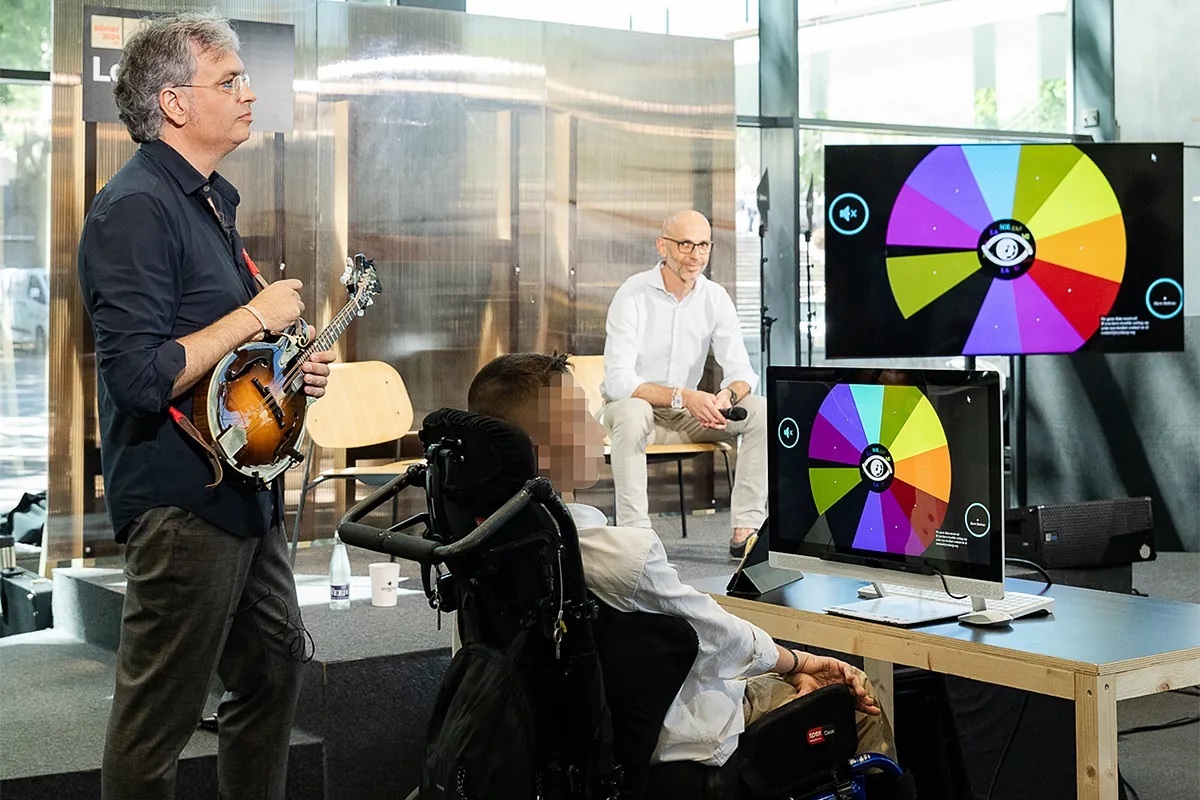Joel Bueno is 16 years old and has spastic cerebral palsy. He also has a musical career as a performer, with performances at the Liceu in Barcelona or the Sónar festival. During the last edition of the latter, he demonstrated this facet of his, thanks to the help of Eyeharp. This is the name of a revolutionary tool that allows people with disabilities to play instruments. "For me, being able to make music means that I have the freedom to express my emotions and feelings, as I cannot do it with speech," explains Joel. "Playing music is not just that, but it also gives me the opportunity to work and interact with other people. And that is very important to me."
Eyeharp has been developed by the SIFU Group Foundation, dedicated to promoting and fostering the social and work integration of people with disabilities, as well as raising awareness in society about this group. In Joel's case, they have collaborated with the company ABB, which provides a robotic arm that translates the movements of his eyes to a piano. Joel himself explains it: "The Eyeharp is a software arranged in a circular layout; to make it easier to reach all the notes with the gaze. It is also a MIDI that can be used to play any instrument. It even works with animals, for people with cognitive disabilities...".
Oriol Saña is the artistic director of the SIFU Group Foundation and accompanies Joel in his concerts. In these, an infrared webcam detects the movement of the eyes on a round keyboard. Initially, it was a simple synthesizer, but SIFU wanted to go further. "We have been working for over six years in different music schools or concerts with Eyeharp," says Saña. "But we wanted a person with cerebral palsy to be able to play a piano directly in this case. For that, we needed hardware to make it possible. So, what we did was develop with ABB this robotic application that through the fusion of the eye tracking device, or tracker, plus the robot makes it possible for people with limited mobility to interact with musical instruments."
ABB's robotic arm, which transforms Joel's eye movements into piano keystrokes.SÓNAR
The first problem they encountered was latency, "which is the time elapsed between looking at the note and the robot playing the key, thus converting the movement command into music." Once the speed was refined, the possibilities are practically endless, highlights Sergio Martín, general director of ABB. The company has provided an arm like those used in the Mercedes-Benz factory in Vitoria, but with a different purpose: "Putting robots at the service of people with disabilities." And he points out that the "backbone" of the project is articulated with several parts: "We want to reduce barriers, increase independence, expand capabilities, and provide more opportunities for people with motor disabilities." And not only within the cultural sphere: "A crane could be operated, work in the Office, play chess...," adds Saña.
"We have used an industrial robot and we are already working on a smaller robot," adds the artistic director. "Our intention is for it to have greater autonomy. And for Joel to be able to play a grand piano, as he will do at the SuperArte gala on November 11 at the Teatre del Liceu, feeling how the piano hammer strikes the string and perceiving that sound reverberation closer." Saña considers what has been achieved with Joel over the past five years as "a huge step," which allows glimpsing a horizon: "Eliminating barriers and discrimination related to functional diversity." Because, as he denounces, "in Spain, 50% of people with disabilities cannot participate in cultural activities due to lack of access." Hence the importance of the effort invested: "A few years ago, it was unthinkable for a person with cerebral palsy to play an instrument."
And besides reminding that the feat did not happen thousands of kilometers away ("This is something national, done here, in Barcelona," he proclaims), he points out the change in mentality that Eyeharp and other tools can bring regarding how society views people with disabilities: "In the end, they have other abilities or super abilities," he recalls. "And from an emotional aspect, it is achieved that these people feel useful, that they think they could do things that were previously out of reach: play with their siblings or say, 'I want to be a musician.' Which is what happened with Joel." And he expresses a final wish: "Hopefully the word 'inclusion' will disappear in a few years and become something normal, because everything is adapted." Joel also has a desire: "I would like to continue learning music, enjoy, interact with musicians, and play with the Eyeharp. To make this wonderful instrument known and give concerts. Because being on stage... I love it!".
